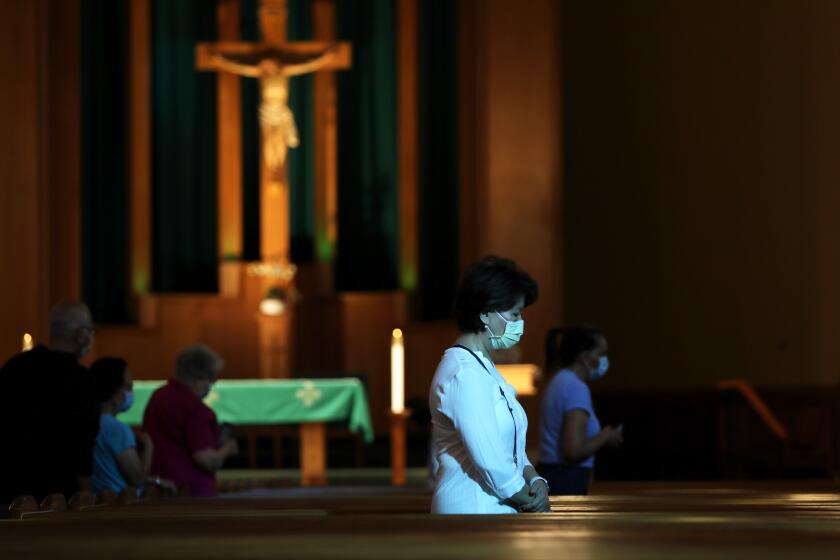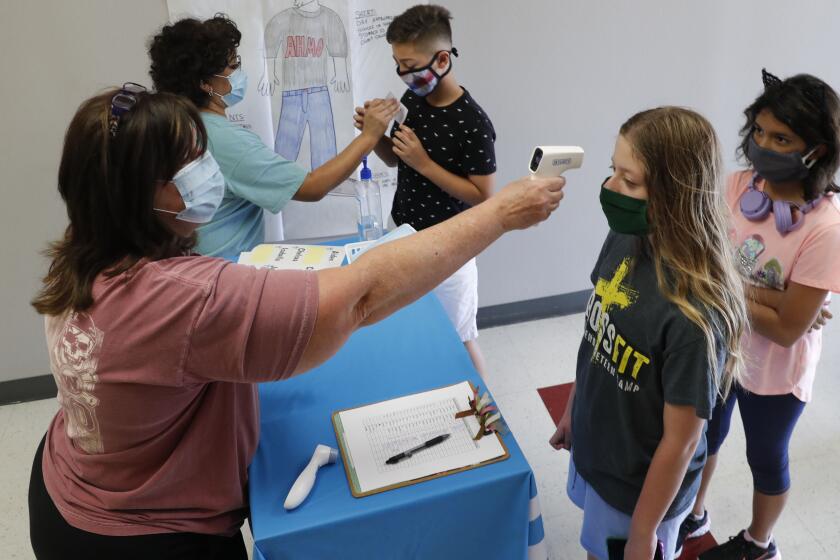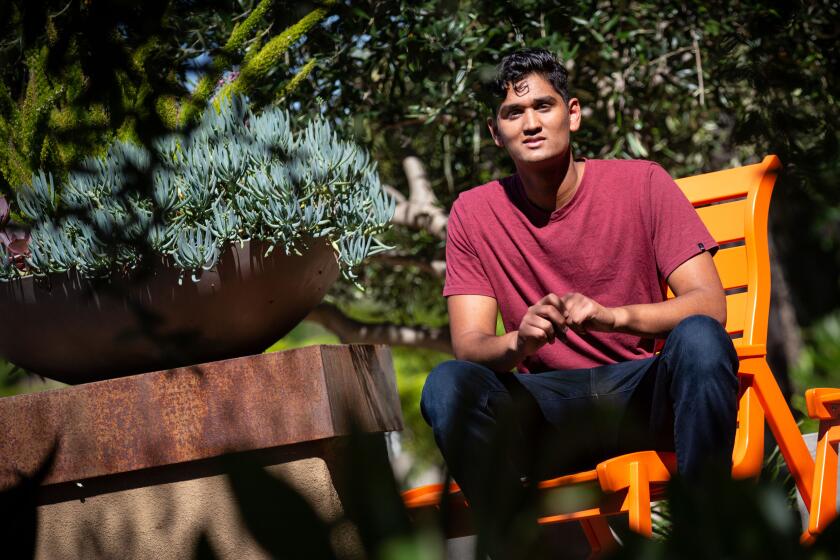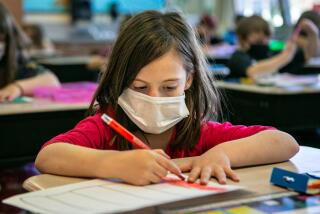For millions of kids, full return to school in fall unlikely due to coronavirus
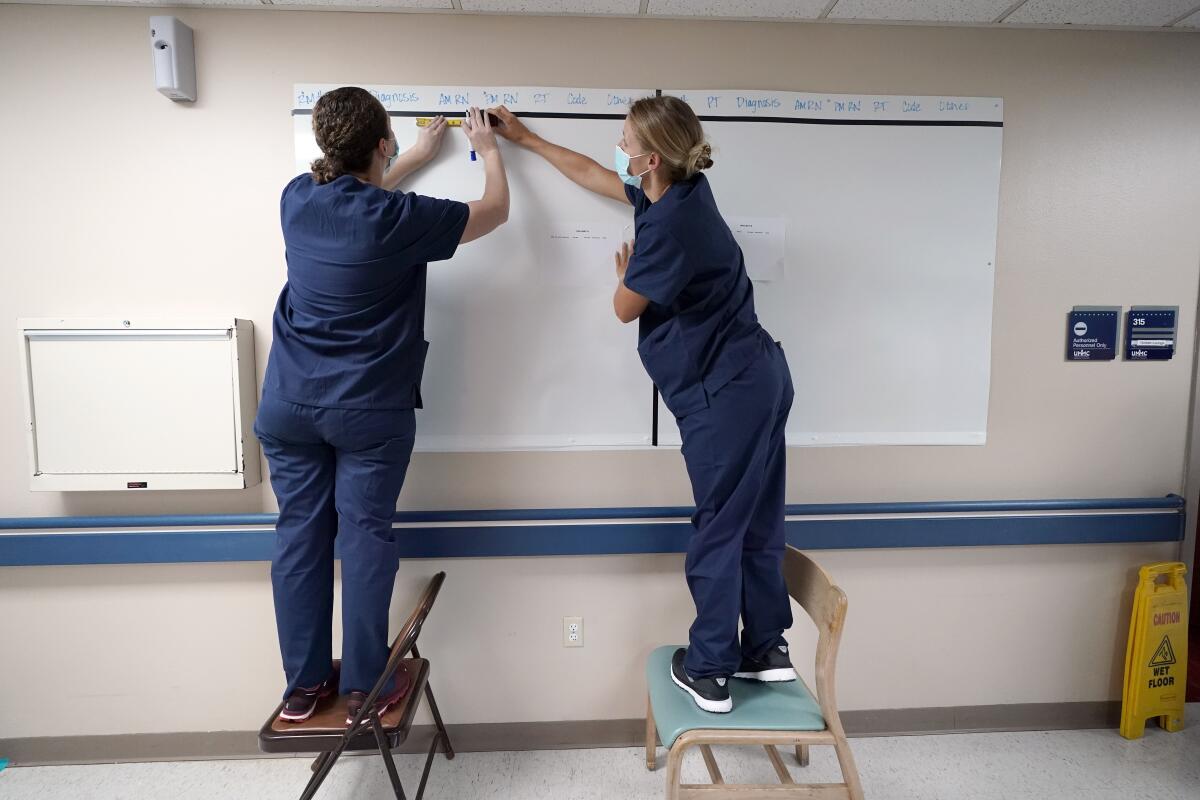
- Share via
FORT LAUDERDALE, Fla. — Millions more children in the U.S. learned Friday that they’re unlikely to return to classrooms full time in the fall due to the COVID-19 pandemic, as officials laid out new details of what lies ahead after summer vacation.
The announcements came as many states — particularly in the Sunbelt — struggled to cope with a surge in the number of COVID-19 cases. Teams of military medics were deployed in Texas and California to help hospitals deluged by coronavirus patients, and Miami area authorities began stepping up enforcement of a mask requirement.
California Gov. Gavin Newsom laid out strict criteria for school reopenings that makes classroom instruction unlikely for most districts. The rules mandate that students above second grade and all staff wear masks in school.
Texas gave public schools permission to keep their facilities closed for more than 5 million students well into the fall. Under the new guidelines, schools can hold online-only instruction for up to the first eight weeks of the school year, potentially pushing a return to campus in some cities until November.
Most Chicago children would return to the classroom just two days a week and spend the other three days learning remotely under a tentative plan outlined by officials from the nation’s third-largest school district. A final decision for fall classes for the district’s more than 300,000 students won’t come until late August.
Iowa Gov. Kim Reynolds announced she will override local school districts and require students to spend at least half of their schooling in classrooms. Her proclamation drew immediate criticism from the state teachers union.
Mask-wearing in public has become an increasingly pressing and politicized issue as the economy reopens and cases surge across the nation.
Several states have been reporting record numbers of COVID-19 cases this week, contributing to a surge in the national death rate. The seven-day rolling average for daily new deaths has risen 34% from two weeks ago, while the case count in that period shot up 43%.
Florida reported 128 new deaths Friday and 11,345 new cases.
Texas reported 10,000 new cases for the third straight day Thursday and 129 additional deaths. California reported its largest two-day total of confirmed cases, nearly 20,000, along with 258 deaths over 48 hours.
There were signs across the Sunbelt that the virus was stretching authorities’ capacity to respond. The medical examiner’s office in metro Phoenix has gotten portable storage coolers and ordered more to handle an influx of bodies — reminiscent of New York City at the height of the pandemic there.
In Houston, an 86-person Army medical team worked to take over a wing of United Memorial Medical Center. In California, military doctors, nurses and other health care specialists were being deployed to eight hospitals facing staffing shortages amid a record-breaking case numbers.
Here’s what scientists know about kids’ potential to spread the coronavirus and the risks of sending them back to school amid the COVID-19 pandemic.
Some hospitals in South Carolina are also being squeezed: The number of patients with COVID-19 is increasing rapidly, while nurses and other workers are also getting infected when they are off work, said Dr. Wendell James, a senior vice president with Prisma Health who is based in Greenville.
“The majority of the illness we see in our nursing staffs and our support staff is community spread,” he said. “Almost all of it I can’t control.”
In Florida, Miami-Dade County’s commission gave code and fire inspectors authority to issue tickets of up to $100 for individuals and $500 for businesses not complying with guidelines to wear masks and practice social distancing. Police officers already had this enforcement power.
Shaun Alley, the assistant manager of Blue Collar, a Miami restaurant that serves comforting fare, said that all of the customers eat outside on picnic tables and are asked to wear masks when not eating.
“We tell people flat out: Either you comply or we have the right not to serve you,” he said. “We haven’t had any issues so far.”
At least half of the 50 states have adopted requirements for wearing face coverings.
But in Georgia, Gov. Brian Kemp has banned cities and counties from requiring face coverings. He sued Atlanta late Thursday to prevent it from defying his order, but Atlanta Mayor Keisha Lance Bottoms said she was prepared to go to court to maintain the local mask requirement.
Worldwide, governments are frantically trying to prevent and control fresh outbreaks and keep their economies running as the pandemic accelerates in some regions and threatens to come roaring back in others. Globally, confirmed cases numbered more than 13.8 million Friday and COVID-19 deaths totaled more than 590,000.
Everyone has an opinion about the value of taking a gap year after high school or during college. For those who do so, it can be a chance for an adventure as well as an opportunity to grow and mature.
To cope with the pandemic’s fallout, the United Nations said it is increasing to $10.3 billion its appeal for humanitarian aid.
Jens Laerke, a spokesman for the U.N. Office for the Coordination of Humanitarian Affairs, said in Geneva that the number of people who need assistance has more than doubled during the pandemic to about 250 million.
India’s total confirmed cases surpassed 1 million, the third-highest number behind the United States and Brazil, and its death toll reached more than 25,000. That followed Brazil’s announcement Thursday evening that its confirmed cases exceeded 2 million, including 76,000 deaths.
The continuing surge in India — where experts believe the vast majority of cases are still being missed — drove home concerns over the readiness of some countries to cope with outbreaks that could test feeble healthcare systems.
In sub-Saharan Africa, which already had the world’s greatest shortage of medical personnel, nearly 10,000 health workers in 40 countries have been infected with the coronavirus, the World Health Organization said.
In Spain, which earlier in the pandemic was one of the world’s hardest hit countries, health authorities asked the 5.5 million residents of Barcelona to stay at home as much as possible to stem the virus’ spread.
British Prime Minister Boris Johnson charted a different course, announcing that as of Aug. 1 the government was no longer asking people to avoid public transit and would stop advising workers in England to work from home.
The U.K.’s official death toll, which stood at more than 45,000 as of Friday, has for several weeks been the highest in Europe.
More to Read
Sign up for Essential California
The most important California stories and recommendations in your inbox every morning.
You may occasionally receive promotional content from the Los Angeles Times.
